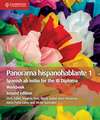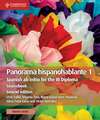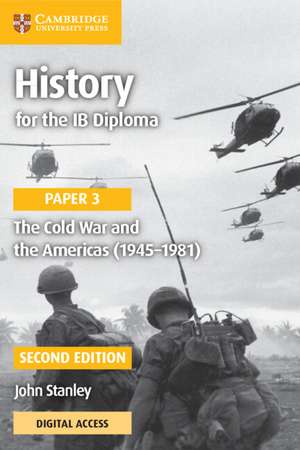History for the IB Diploma Paper 3 The Cold War and the Americas (1945–1981) with Digital Access (2 Years): IB Diploma
Autor John Stanleyen Limba Engleză Mixed media product – 14 mai 2019
Din seria IB Diploma
-
 Preț: 73.77 lei
Preț: 73.77 lei - 23%
 Preț: 1322.24 lei
Preț: 1322.24 lei -
 Preț: 412.32 lei
Preț: 412.32 lei - 9%
 Preț: 858.69 lei
Preț: 858.69 lei -
 Preț: 242.67 lei
Preț: 242.67 lei -
 Preț: 242.19 lei
Preț: 242.19 lei -
 Preț: 79.14 lei
Preț: 79.14 lei -
 Preț: 367.75 lei
Preț: 367.75 lei -
 Preț: 368.95 lei
Preț: 368.95 lei -
 Preț: 158.81 lei
Preț: 158.81 lei -
 Preț: 167.15 lei
Preț: 167.15 lei -
 Preț: 221.39 lei
Preț: 221.39 lei -
 Preț: 348.79 lei
Preț: 348.79 lei -
 Preț: 114.53 lei
Preț: 114.53 lei -
 Preț: 157.63 lei
Preț: 157.63 lei -
 Preț: 387.85 lei
Preț: 387.85 lei -
 Preț: 183.54 lei
Preț: 183.54 lei -
 Preț: 434.47 lei
Preț: 434.47 lei -
 Preț: 243.64 lei
Preț: 243.64 lei - 23%
 Preț: 1215.91 lei
Preț: 1215.91 lei -
 Preț: 381.77 lei
Preț: 381.77 lei -
 Preț: 156.67 lei
Preț: 156.67 lei -
 Preț: 255.23 lei
Preț: 255.23 lei -
 Preț: 407.55 lei
Preț: 407.55 lei -
 Preț: 157.14 lei
Preț: 157.14 lei - 8%
 Preț: 505.53 lei
Preț: 505.53 lei -
 Preț: 167.78 lei
Preț: 167.78 lei -
 Preț: 386.09 lei
Preț: 386.09 lei - 16%
 Preț: 797.99 lei
Preț: 797.99 lei -
 Preț: 158.11 lei
Preț: 158.11 lei - 9%
 Preț: 858.26 lei
Preț: 858.26 lei -
 Preț: 242.43 lei
Preț: 242.43 lei -
 Preț: 114.77 lei
Preț: 114.77 lei - 8%
 Preț: 424.77 lei
Preț: 424.77 lei - 23%
 Preț: 1288.91 lei
Preț: 1288.91 lei -
 Preț: 181.92 lei
Preț: 181.92 lei - 9%
 Preț: 893.93 lei
Preț: 893.93 lei -
 Preț: 347.74 lei
Preț: 347.74 lei -
 Preț: 73.54 lei
Preț: 73.54 lei -
 Preț: 290.62 lei
Preț: 290.62 lei -
 Preț: 79.14 lei
Preț: 79.14 lei -
 Preț: 487.74 lei
Preț: 487.74 lei - 19%
 Preț: 426.58 lei
Preț: 426.58 lei -
 Preț: 330.34 lei
Preț: 330.34 lei -
 Preț: 368.67 lei
Preț: 368.67 lei -
 Preț: 242.69 lei
Preț: 242.69 lei -
 Preț: 242.22 lei
Preț: 242.22 lei - 8%
 Preț: 476.66 lei
Preț: 476.66 lei -
 Preț: 411.37 lei
Preț: 411.37 lei -
 Preț: 168.05 lei
Preț: 168.05 lei
Preț: 308.56 lei
Nou
Puncte Express: 463
Preț estimativ în valută:
59.05€ • 61.42$ • 48.75£
59.05€ • 61.42$ • 48.75£
Carte disponibilă
Livrare economică 25 martie-08 aprilie
Preluare comenzi: 021 569.72.76
Specificații
ISBN-13: 9781108760713
ISBN-10: 1108760716
Pagini: 336
Dimensiuni: 150 x 228 x 13 mm
Greutate: 0.5 kg
Ediția:2Nouă
Editura: Cambridge University Press
Colecția Cambridge University Press
Seria IB Diploma
Locul publicării:Cambridge, United Kingdom
ISBN-10: 1108760716
Pagini: 336
Dimensiuni: 150 x 228 x 13 mm
Greutate: 0.5 kg
Ediția:2Nouă
Editura: Cambridge University Press
Colecția Cambridge University Press
Seria IB Diploma
Locul publicării:Cambridge, United Kingdom
Cuprins
1. Introduction; Chapter 2. The US and the Cold War 1945–61, with case-studies of Cuba and Chile: 2.1. How are the government and political system in the US structured?; 2.2. What were the implications for the US and the Americas of Truman's response to the emerging Cold War from 1945 to 1950?; 2.3. What was the effect of US participation in the Korean War, 1950–53?; 2.4. How far did 'New Look' under Eisenhower and Dulles change US–Soviet relations?; 2.5. What was the US's response to Cold War developments in the Americas?; 2.6. Case Study: Cuba 1945–59: Why were relations between Cuba and the US historically important?; 2.7. Case Study: Cuba 1945–59: Why was there a revolution against Batista?; 2.8. Case Study: Chile 1945–64: How did the early years of the Cold War affect Chile?; 2.9. Case Study: Chile 1945–64: To what extent did the US influence Chilean politics 1952–64?; Chapter 3. The US and the Cold War 1961–81, with case-studies of Cuba and Chile: 3.1. How did Kennedy define US foreign policy from 1961 to 1963?; 3.2. Why did the Vietnam War have such a profound effect on the US and in the Americas?; 3.3. How did US foreign policy change under Nixon in the 1970s?; 3.4. Why was Jimmy Carter an 'outsider' in foreign policy 1977–81?; 3.5. What were the implications of US foreign policy for the Americas between 1961 and 1981?; 3.6. How did the Cold War further influence domestic policy in the US between 1961 and 1981?; 3.7. Case Study: Cuba 1959–81: What impact did the Cuban Revolution have on the Cold War?; 3.8. Case Study: Cuba 1959–81: Did the Cold War influence Castro's domestic policy?; 3.9. Case Study: Chile 1964–81: How did the left come to power in Chile?; 3.10. Case Study: Chile 1964–81: What was the impact of the Pinochet regime after 1973?; Chapter 4. Canada and the Cold War 1945–63: 4.1. How are the government and political system in Canada structured?; 4.2. What were the long-term implications of the Cold War on foreign policy in Canada between 1945 and 1963?; 4.3. To what extent did the Cold War influence different areas of Canadian domestic policy?; Chapter 5. Canada and the Cold War 1964–81: 5.1. What were the long-term implications of the Cold War on foreign policy in Canada between 1964 and 1981?; 5.2. How did the Cold War in the 1960s and 1970s influence different areas of Canadian domestic policy?; 5.3. Did the Cold War change Canada?; Chapter 6. Exam practice; Further Reading; Index.
Descriere
Comprehensive books to support study of History for the IB Diploma Paper 3, revised for first assessment in 2017.
